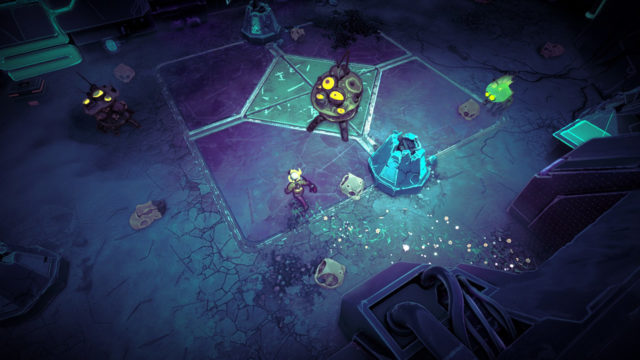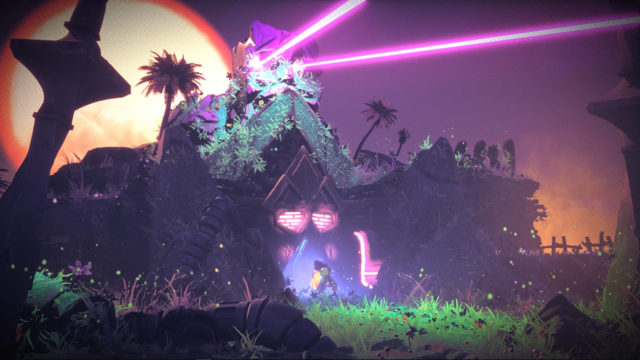Great soundtrack; some interesting mutation powers; clever mechanics to speed up exploration and backtracking; assist features to properly balance the game
80S REFERENCES!!!!!!; combat sometimes poorly balanced due to randomness of mutations and ineffectual basic attacks; feels cynical given current trends favoring 80s aesthetics and prevalence of roguelikes
Developer DoubleFine has long had a knack for creating incredibly clever and creative titles in terms of story, aesthetics, and gameplay. Naturally, only such a creative group could come up with the idea of a roguelike in a world wallpapered in 80s nostalgia (I hope the sarcasm is evident enough). While it possesses the attention to detail afforded by its seasoned developers and large publisher, Bandai Namco, RAD proves to be a surprisingly flawed and derivative experience.
The story behind RAD is simple enough. You assume the role of one of several teenage heroes with no characterization in a post-apocalyptic world where one of the few vestiges of humanity left is on the verge of extinction and only you can save it by venturing into the irradiated wasteland. It’s been done a million times before, but there is additional lore scattered throughout the game world that reveals a bit more in bits and pieces. This never amounts to a real or worthwhile story and what’s there isn’t all that noteworthy, but it’s at least something for those with an interest to delve into, especially if they want to see every 80s-reference squeezed into the game.
While the world and story bring nothing new to the table, RAD deserves at least a nod for making an effort to introduce some interesting concepts to the roguelike genre, especially when it comes to exploration and backtracking. As you wander through the in-game wasteland, the Fallow, you leave behind a trail of freshly grown grass and flowers as you literally restore life to the land with each step. Walking over this new vegetation grants you a speed boost, meaning backtracking through previously explored areas literally goes faster. This feature even proves tactically useful as strategically coating certain combat arenas with greenery can give you an advantage when dealing with especially tough foes. Also, the designs of the randomly generated levels include randomly generated mini-dungeons that feature plenty of teleporters that further accelerate the exploration process. Unfortunately, this is where worthwhile originality really comes to a close.

As a roguelike, RAD is a game built upon replayability; it’s difficult and isn’t upfront about explaining all of its mechanics, thus making many deaths and restarts an inevitability. Of course, most of your progress is limited within each playthrough, with the most noteworthy being the various mutations unlocked as you move forward. New abilities are earned by collecting experience in the form of radiation from defeated foes that adds new attack and movement skills via literal mutations. Another type of mutation provides passive bonuses and they are unlocked through exploration and interacting with certain lost machines from the past civilizations. Further perks can be acquired through items either found in treasure chests unlocked with keys or bought with currency (floppy disks and cassette tapes respectively, because LOL 80s).
What really hampers this system is how dependent you are on random chance, as that is entirely what determines what mutations you get and items you find. You will almost certainly get your first mutation before the boss fight at the end of the first stage and you better hope you get a ranged attack ability because without that your likelihood of death rises significantly and if you manage to survive, it will have meant you just suffered your way through a long and likely boring battle. The real problem with combat is that your basic attack, swinging a baseball bat, and the handful of maneuvers you can pull off with it, quickly become irrelevant. Normal battles in the first few stages are generally fine with just the bat, but bigger monsters and bosses with big health bars and a broader variety of ranged and area-of-effect attacks are a nightmare thanks to the bat’s extremely limited range and your character’s annoyingly slow movement speed when not traversing the aforementioned foliage. Later stages are nearly impossible without a full suite of skills, which makes the late-game addition of effects that can disable mutations especially infuriating.
In RAD’s defense, it effectively comes with an easy mode thanks to the inclusion of assist options buried quite inconveniently in the options menu. The fact that one of these options is to start the game with a ranged mutation attack is telling; I feel like it’s almost an admission on the part of the developers that it should be the default. Other assists could benefit from offering multiple levels of help. For example, selecting extra health literally doubles your starting health bar. There should be an option to add just a fraction of that for gamers looking for just a little boost rather than such an extreme advantage that almost all difficulty is erased until the later levels.
Of course, another feature of the roguelike genre is the progress that carries over from one playthrough to another, and here RAD manages to fare decently. Your total experience throughout your time with the game accumulates to unlock new playable characters, new items you might find in the game world, modifiers called “quirks,” and new bats with various quirks. Disappointingly, new characters are simply skins with no unique effect on gameplay, however the changes offered by the bats and quirks are more interesting, while still being balanced as they might give only small benefits in very unique circumstances or their bonuses might be counteracted by new weaknesses in other areas. Also, surviving a level gives you a chance to return to your village where you can deposit cassettes for future playthroughs and buy items at a shop with an inventory that expands as you spend more money there.

The visual design definitely feels more cohesive, though that too also proves frustrating, at least on a more personal level. Overall, the game looks pretty good on Switch but it’s not without its faults. Load times are generally long, and slowdown tends to show up fairly consistently when the action ramps up, which happens quite a bit in later levels. Also, certain parts of the game can look somewhat pixelated and grainy, though I honestly don’t know if that’s a problem rendering certain effects, a drop in resolution, or the developers intentionally trying to create a low-fi, VHS look at times. However, the biggest presentation sin is just the overall look of the game. RAD’s art direction is cohesive and there is a visual progression from one stage to the next as is indicated from the many fine details scattered throughout by the art team, but the overbearing color schemes drowns this all out as you simply see a change from neon green to neon purple. Yes, I get it, this game was inspired by the 80s!
Thankfully, this love for that bygone era translates better to the audio design. There is quite a bit of voice work in the game, but it’s mostly relegated to brief lore blurbs and repetitive attempts at unoriginal humor and pop culture references. The music follows a similar concept but is much more successful as it does a good job of drawing more nuance from the varied musical stylings of the 80s. In other words, there’s more than just generic synth-pop. Part of one song is pretty much just the verse from Duran Duran’s “Rio” minus the lyrics- this is not a complaint. The soundtrack traverses synth-driven soundscapes, punchy bass lines, and even the occasional hair-metal guitar lick. Musically, the 80s was more than just a single note, and RAD does a much better job of capturing that than many of its similarly inspired peers. To put it simply, the sound design feels like a genuine love letter to the music of the era, while the visuals and writing feel cynical.
The final impression is that RAD is a game competently put together but with a fairly lazy ambition. The various mutations are interesting and present unique concepts for creative builds, but the random nature of the game and the balance of combat clearly favors some skills over others and squanders that potential. The world is filled with interesting lore but randomly generated roguelikes are inherently bad at delivering narrative. The artists obviously put a lot of effort into filling the world with fine details inspired by the 80s, but the overall tone of the game reviles the concept of nuance and blasts the influence in our face with the unyielding intensity of a neon supernova. But at least the soundtrack is pretty good.
As it stands, RAD will likely please roguelike aficionados who will forgive ill-conceived gameplay ideas because of the challenge it adds to the experience. But I couldn’t help but see the wasted potential from beginning to end. The various mutations could present clever ideas for unique builds and a multitude of ways to solve problems in a planned, not random, world. This course would have also allowed for more balanced combat and a greater focus on narrative. But… NOPE! Roguelikes are popular now and so is nostalgia for the 80s so let’s just squish those things together and call it a day! Thus, RAD was born.
Nintendojo was provided a copy of this game for review by a third party, though that does not affect our recommendation. For every review, Nintendojo uses a standard criteria.




 ShareThis
ShareThis






From its announcement, this has reminded me of Totally Rad, an NES game also dripping with 80s flavors, great music, and interesting-but-unbalanced transformations.
Does anybody know if there was any developer overlap or “spiritual successor” type relation to that old Aicom/Jaleco game?
It wasn’t any great classic, but despite its shortcomings it had a certain charm I’ve always enjoyed. I wonder if I’d feel the same about this one?